
24 minute read
Lilianne Ploumen succeeds Lodewijk Asscher as Labour
from The Voice magazine
Lilianne Ploumen succeeds Lodewijk Asscher as Labour Party Leader
Lilianne Ploumen has been confirmed as the new leader of the Labour party (PvdA) following the resignation of Lodewijk Asscher over his role in the child benefits scandal. The 58-yearold Ploumen is currently deputy chair of the party and was the minister for development aid in Mark Rutte’s previous cabinet. Her appointment means two of the five parties that have made up Dutch governments since 1982 are now led by women. Ploumen was one of the front runners to succeed Asscher after he stepped down last month. She was third on the PvdA’s original list of candidates and is one of the party’s most prominent and popular MPs. At the last election in 2017, she was ranked 10th on the party’s list as Labour slumped to nine seats, but still got into parliament after receiving nearly 20,000 personal votes. She decided in 2017 set up the ‘She Decides fund’ in response to former President Donald Trump’s decision to withdraw financial support from groups that advocate or assist with abortion around the world. The fund raised €400 million in its first year and earned her the Machiavelli prize for public communication. Asscher’s decision to quit last month played a key role in Mark Rutte’s decision to tender his cabinet’s resignation the following day over the child benefits scandal. As social affairs minister and deputy prime minister, Asscher was responsible for the Dutch tax office’s ‘zero tolerance’ policy towards benefit fraud that led to thousands of families being wrongly accused and forced to pay back huge sums in childcare allowances. The policy overwhelmingly targeted families with dual nationality and drove some to financial ruin, costing them their homes, jobs and livelihoods. A parliamentary inquiry in December last year found that the parents involved had suffered an ‘unprecedented injustice’ at the hands of the politicians who devised the policy. Elections is to be held in March 2021, we would see how this play out and if it would affect her politically but according to her, “I am ready for the challenge to led PvdA through this difficult times’
Advertisement


The Human Cost of Ethiopia’s Fighting in Tigray Grows
People who fled fighting in Ethiopia’s Tigray area continue to tell stories of suffering as they gather in refugee camps. At a simple medical center in Sudan, a doctor who is also a refugee cares for the hurt and sick. Tewodros Tefera sees many injuries: children hurt in explosions, wounds from axes and knives, and broken bones from beatings. Recently, he treated the broken legs of refugee Guesh Tesla, a woodworker who just arrived at the camp. He came with information about 250 young men taken from one village into neighboring Eritrea by Eritrean forces. Ethiopia denies Eritrean forces are involved in the fighting. In late November, Guesh said he saw many bodies on the streets in his hometown of Rawyan. There, he said, Ethiopian soldiers beat him and took him to the border town of Humera. The Humera courthouse, he said, had been turned into a center for killing by militias from the neighboring Amhara area. He heard the screams of men being killed, and quietly escaped during the night. “I would never go back,” he said. It is impossible to know if these stories are true as Tigray remains almost completely cut off from the world. It
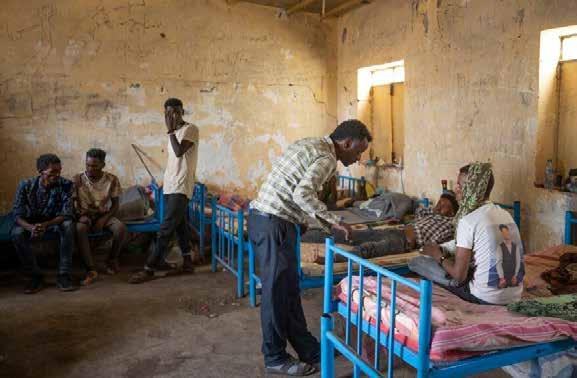

has been more than 50 days since fighting began between Ethiopian forces and groups in Tigray. The Tigray people led the country’s government for nearly 30 years, but are now marginalized. Ethiopian Prime Minister Abiy Ahmed continues to refuse international requests to bring humanitarian assistance to the area. He also refuses requests from those pressing for investigations of Ethiopian forces. Last year, Abiy won the Nobel Peace Prize for political reforms. But this conflict threatens to end his peace-making activities. “I know the conflict has caused unimaginable suffering,” Abiy wrote last week. He argued, however, that “the heavy cost we incurred as a nation was necessary” to hold the country together. No one knows how many thousands of people have been Now, refugees are arriving from areas deeper inside Tigray. They have more severe trauma, Tewodros said. He said there are signs of starvation and dehydration and some gunshot wounds among the refugees. In the future, the stories of refugees, like Tewodros and Guesh, and the people who are still in Tigray, will show how much abuse was carried out against people for ethnic reasons. “Everyone looks at you and points out the part of you that doesn’t belong to them,” said Tewodros. He is both an ethnic Tigrayan and Amhara. “So, if I go to Tigray, they would pick up that I’m Amhara because Amhara is not a part of them. When I go to Amhara, they would pick up the part of Tigray because Tigray is not a part of them.” Such differences have become deadly. Many ethnic Tigrayan refugees have accused ethnic Amhara fighters of targeting them. The Amhara militias are fighting with
Ethiopian government forces.

Abrahaley Minasbo a 22-year-old trained dancer and Tigrayan survivor from Mai-Kadra, Ethiopia, shows wounds on his face inside a shelter, in the Hamdeyat Transition Center near the Sudan-Ethiopia border, eastern Sudan last December 2020.
killed in Tigray since the fighting began on November 4. The United Nations has said there are reports of artillery strikes on populated areas, civilians being targeted and looting. Abrahaley Minasbo is a 22-year-old dancer. He said
Amhara militia members pulled him from his home in Mai-Kadra on November 9. They beat him in the street with an axe and other tools, and they left him to die. He survived and made it to Sudan. His face is covered with scars.
For Tewodros, the conflict has been about the wounded civilians.
In November, he worked at a hospital in Humera that came under fire. He insisted some of the shelling came from the direction of Eritrea. Fifteen bodies arrived at the hospital that first day, and eight the next, he said. The shelling continued. He and his colleagues fled, after moving wounded patients to a nearby village. Tewodros and colleagues hid for two days in the forest, hearing gunfire. They later walked for more than 12 hours, crossing a river into Sudan, where he started treating wounded refugees for the Sudanese Red Crescent Society. “Where we are now is extremely unsafe,” he said of the refugee center near the border. He said the Amhara fighters threaten the refugees from the other side of the river. The militias “are more dangerous than the Ethiopian national forces,” he said.
By Susan Shand.
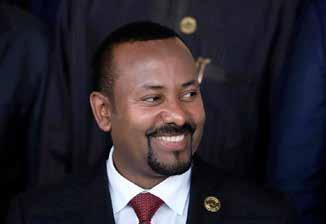
The Ngozi Okonjo-Iweala we present to the world ......
Dr. Ngozi Okonjo-Iweala is a global finance expert, an economist and international development professional with over 30 years of experience working in Asia, Africa, Europe, Latin America and North America. Currently, Dr Okonjo-Iweala is Chair of the Board of Gavi, the Vaccine Alliance. Since its creation in 2000, Gavi has immunized 760 million children globally and saved thirteen million lives. She sits on the Boards of Standard Chartered PLC and Twitter Inc. She was recently appointed as African Union (AU) Special Envoy to mobilise international financial support for the fight against COVID-19 and WHO Special Envoy for Access to COVID-19 Tools Accelerator. She is a skilled negotiator and has brokered numerous agreements which have produced win-win outcomes in negotiations. She is regarded as an effective consensus builder and an honest broker enjoying the trust and confidence of governments and other stakeholders. trading system is in the interests of all countries, particularly least developed and African countries. She is renowned as the first female and African candidate to contest for the presidency of the World Bank Group in 2012, backed by Africa and major developing countries in the first truly contestable race for the world’s highest development finance post. As Managing Director of the World Bank, she had oversight responsibility for the World Bank’s $81 billion operational portfolio in Africa, South Asia, Europe and Central Asia. Dr Okonjo-Iweala spearheaded several World Bank initiatives to assist low-income countries during the 2008-2009 food crisis and later during the financial crisis.
Previously, Dr. Okonjo-Iweala twice served as Nigeria’s Finance Minister (2003-2006 and 2011-2015) and briefly acted as Foreign Minister in 2006, the first woman to hold both positions. She distinguished herself by carrying out major reforms which improved the effectiveness of these two Ministries and the functioning of the government machinery. She had a 25-year career at the World Bank as a development economist, rising to the No. 2 position of Managing Director, Operations. As a development economist and Finance Minister, Dr Okonjo-Iweala steered her country through various reforms ranging from macroeconomic to trade, financial and real sector issues. She is a firm believer in the power of trade to lift developing countries out of poverty and assist them to achieve robust economic growth and sustainable development. As Finance Minister, she was involved in trade negotiations with other West African countries and contributed to the overhaul of Nigeria’s trade policy enabling it to enhance its competitiveness. She has closely followed developments at the WTO, as she believes that a strengthened multilateral In 2010, she was Chair of the World Bank’s successful drive to raise $49.3 billion in grants and low interest credit for the poorest countries in the world.

wiping out of $30 billion of Nigeria’s debt, including the outright cancellation of $18 billion. In her second term as Finance Minister, Dr Okonjo-Iweala was responsible for leading reform that enhanced transparency of government accounts and strengthened institutions against corruption, including the implementation of the GIFMS (Government Integrated Financial Management System), the IPPMS (Integrated Personnel and Payroll Management System), and the TSA (Treasury Single Accounts). Dr Okonjo-Iweala has been listed as Minister of the Decade, People’s Choice Award by Nigeria’s This Day newspaper (2020), one of Transparency International’s 8 Female Anti-Corruption Fighters Who Inspire (2019), one of the 50 Greatest World Leaders (Fortune, 2015), the Top 100 Most Influential People in the World (TIME, 2014), the Top 100 Global Thinkers (Foreign Policy, 2011 and 2012), the Top 100 Most Powerful Women in the World (Forbes, 2011, 2012, 2013 and 2014), the Top 3 Most Powerful Women in Africa (Forbes, 2012), the Top 10 Most Influential Women in Africa (Forbes, 2011), the Top 100 Women in the World (The UK Guardian, 2011), the Top 150 Women in the World (Newsweek, 2011), and the Top 100 most inspiring people in the World Delivering for Girls and Women (Women Deliver, 2011). She has also been listed among 73 “brilliant” business influencers in the world by Condé Nast International. In 2020, she became an Angelopoulos Global Public Leader at Harvard University Kennedy School. She was also appointed to the Presidential Economic Advisory Council (PEAC) for President of South Africa His Excellency Cyril Ramaphosa. In 2019, Dr Okonjo-Iweala was elected to the American Academy of Arts and Sciences. In 2017, she received the Madeleine K. Albright Global Development Award from the Aspen Institute, the Women’s Economic Empowerment Award from WEConnect International, and the Vanguard Award from Howard University. In 2016, she received the Power with Purpose Award from the Devex Development Communications Network and the Global Fairness Award from the Global Fairness Initiative in recognition of her contribution to sustainable development. She was also conferred High National Honours from the Republic of Cote d’Ivoire and the Republic of Liberia. She is also the recipient of Nigeria’s third highest National Honors Commander of the Federal Republic (CFR). In addition, Dr OkonjoIweala has been awarded the David Rockefeller Bridging Leadership Award (2014), the President

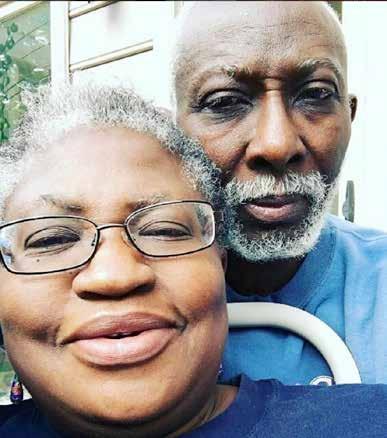
of the Italian Republic Gold Medal by the Pia Manzu Centre (2011), the Global Leadership Award by the Chicago Council on Global Affairs (2011) the Global Leadership Award by the Columbia University School of International and Public Affairs (2010), and the Bishop John T. Walker Distinguished Humanitarian Service Award (2010). She is also the recipient of the TIME Magazine’s European Heroes Award in 2004, named Finance Minister of the Year (Africa Investor Magazine, 2014), Finance Minister of the Year for Africa and the Middle East (THE BANKER, 2004), Global Finance Minister of the Year (EUROMONEY, 2005), Finance Minister of the Year for Africa and the Middle East (Emerging Markets Magazine, 2005), and Minister of the Year (THISDAY, Newspaper 2004 and 2005). Dr Okonjo-Iweala is currently also Chair of the Board of the African Union’s African Risk Capacity (ARC), an innovative weather-based insurance mechanism for African countries; and co-Chair of the Global Commission on the Economy and Climate with Lord Nicholas Stern and Mr Paul Polman. She is also Chair of the Board of the Nelson Mandela Institution, an umbrella body for the African Institutes of Science and Technology, and Chair of the Board of the African University of Science and Technology, Abuja. Dr Okonjo-Iweala is a trustee of the Carnegie Endowment for International
Peace. She presently serves on the following advisory boards or groups — the Asian Infrastructure Investment
Bank, Harvard University International Advisory Board, the Oxford University Martin School Advisory Council,
Mercy Corps International Advisory Board, Women’s
World Banking Africa Advisory Board, the International
Commission on Financing Global Education (Chaired by
Gordon Brown), Japan International Cooperation Agency (JICA) Advisory Board, Tsinghua University Beijing —
School of Public Policy and Management Global Advisory
Board, the CARICOM (Caribbean) Commission on the
Economy, the Bloomberg Task Force on Fiscal Policy for
Health, and Tax Inspectors Without Borders of the OECD among others. She is a member of the B Team of Business and Civic Leaders co-founded by Sir Richard Branson, a board member of the Ellen Johnson Sirleaf Foundation, and also co-chair and board member of Lumos, an Africa focused renewable energy company.
Previously, she was also a Senior Adviser at Lazard (2015-2019) and she served as the co-Chair of the Global Partnership for Effective Development Cooperation with UK Secretary Justine Greening, and Chair of the World Bank’s Development Committee (2004). She was also a member of the International Monetary and Finance Committee of the IMF (2003-2006 and 2011-2015), the United Nations’ Secretary General’s HighLevel Panel on the Post-2015 Development Agenda, the Danish Government-led Commission on Africa, the World Economic Forum Global Leadership Council on Transparency and Corruption, and the Commission on World Growth (led by Nobel Prize winner Professor Michael Spence). She served for a decade on the Rockefeller Foundation Board and the World Economic Forum Young Global Leaders. Dr Okonjo-Iweala has also served on the advisory board of the ONE Campaign, the Clinton Global Initiative, the Global Development Network, and the University of Oxford’s Blavatnik School of Government. Dr Okonjo-Iweala is the founder of Nigeria’s first ever indigenous opinion-research organization, NOI-Polls. She also founded the Center for the Study of Economies of Africa (C-SEA), a development research think tank based in Abuja, Nigeria. She is a Distinguished Visiting Fellow at the Center for Global Development, and also at the Brookings Institution, premier Washington D.C. think tanks. Dr Okonjo-Iweala graduated magna cum laude with an A.B. in Economics from Harvard University (1976) and earned a Ph.D. in Regional Economics and Development from the Massachusetts Institute of Technology (MIT, 1981). She has received honorary degrees from 15 universities worldwide, including from: Yale University, the University of Pennsylvania, Brown University, Trinity College (University of Dublin), Amherst College, Colby College, Tel Aviv University, and Northern Caribbean
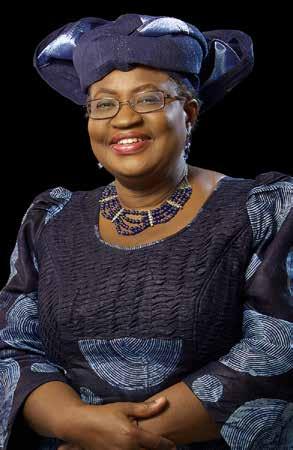
and Leadership: Real Lives, Real Lessons co-authored with Julia Gillard (Penguin Random House, July 2020), Finding A Vaccine is Only the First Step (Foreign Affairs, April 2020), Fighting Corruption is Dangerous: The Story Behind the Headlines (MIT Press, 2018), Reforming the UnReformable: Lessons from Nigeria, (MIT Press, 2012), Mobilizing Finance for Education in the Commonwealth (Commonwealth Education Report 2019), Shine a Light on the Gaps — an essay on financial inclusion for African Small Holder Farmers (Foreign Affairs, 2015), Funding the SDGs: Licit and Illicit Financial Flows from Developing Countries (Horizons Magazine, 2016), and The Debt Trap in Nigeria: Towards a Sustainable Debt Strategy (Africa World Press, 2003). She also co-authored with Tijan Sallah the book Chinua Achebe: Teacher of Light (Africa World Press,

University, Delta State University, Oduduwa University, Babcock University, and the Universities of Port Harcourt, Calabar, and Ife (Obafemi Awolowo). She is the author of numerous articles and several books, including Women 2003).
Dr. Okonjo-Iweala is married to neurosurgeon Dr. Ikemba Iweala. They have four children and three grandchildren.
New lockdown travel rules for South Africa
Cooperative Governance and Traditional Affairs (Cogta) minister Nkosazana Dlamini-Zuma has published new gazettes which update the country’s lockdown travel rules. The gazettes, which were published end of last month and take effect immediately, primarily deal with the country’s borders as well as travel regulations. The regulations state that the 20 land borders which were partially operational will be fully operational, and the 33 land borders which were closed will remain closed. Travelling to and from South Africa over these borders is now allowed, subject to certain restrictions. Daily commuters from neighbouring countries, including for school and teaching, are required to adhere to Covid-19 protocols, including: • Covid-19 screening and quarantine where necessary; • The wearing of a face mask; • Sanitisation and social distancing measures. International travel International travel is restricted to the following airports: • OR Tambo International Airport: • King Shaka International Airport; • Cape Town International Airport. Long -haul flight departures and landings at the airports listed in paragraph are permitted during the hours of curfew. All international travellers arriving at the airports listed must provide a valid certificate of a negative Covid-19 test, recognised by the World Health Organisation. In the event of the traveller’s failure to submit a certificate as proof of a negative Covid-19 test, the traveller will be required to do an antigen test on arrival at his or her own cost and in the event of a traveller testing positive for Covid-19, he or she will be required to isolate him or herself at his or her own cost, for a period of 10 days.

Serena Williams has nothing to prove and should now retire or show true Sportsmanship
Serena Williams’s records are intimidating to say the least among her peers and would be future female tennis stars. She has won a record of 13 Grand Slam singles titles on hard court. Williams holds the Open Era record for most titles won at the Australian Open (7) and shares the Open Era record for most titles won at the US Open with Chris Evert (6). She has nothing more to prove to the female tennis world and she should humbly retire and

start coaching her daughter to better her record in the near future. Serena changed the face of Female tennis alongside her bigger sister, Venus who has no reason any longer to be in competitive tennis competition again. I wonder who her manager is and why she is not advised to spend time now on her businesses than waste precious time on tennis court. The defeats robbing off the great player she was in tennis. Bank to her sister, Serena Williams she has won more Grand Slam singles titles (23) than any other woman or man during the open era. In addition, Serena and her sister Venus won 14 Grand Slam doubles titles; the second most for a pair in the open era, and three doubles gold medals at the Olympics. Watching the new rising star, Naomi Osaka beat Serena at the just concluded Australian Open semi-final is painful and the emotional outburst during the press conference speaks volume that Serena wants this record badly but the strength is failing her to carry on. Next year, she would be 40 and I know she would want to give it a trial again. I wish she can concentrate on other grand slams of the year and if she fails to get this 24th grand slam, nothing to be ashamed of, she would remain one of the greatest female tennis player ever and a black woman for that matter. This was Serena Williams’ 40th Grand Slam Semi-Final, where she has a 33-7 record. After the win, Osaka discussed facing someone who she grew up watching and admitted it can be intimidating. It was not lost on her the significance of defeating a legend. “I was a little kid watching her play, and just to be on the court playing against her, for me is a dream ... It was an honor to play her,” Osaka said on the court at Rod Laver Arena after the match. In a breach of COVID-19 protocol, but an expression of sportsmanship and appreciation for the high level of tennis in their match and careers, Osaka and Williams shared a hug after the match. While heading off the court, Williams addressed the crowd, putting her hand up while she lingered looking at the
fans. She was looking to tie Margaret Court’s record for most career grand slam single titles, currently sitting one shy at 23, but was unable to advance to the final. Since 2017, Williams has advanced to four Grand Slam finals, but has come up short each time. At 39-year-old, she has 72 Career Titles to her name. She

ranks 5th on most Career Singles while Martina Navratilova is on 167, Chris Evert on 157, Steffi Graf got 107 and Margaret Smith Court with 92. Serena Williams has 10 Grand Slam Titles in year 2000s and 13 Grand Slams from 2010 till date. She won 3 Slams out of possible four in the year 2015 (Australian Open, French Open and Wimbledon Open). During this year’s Australian Opens, her husband won a T-Shirt that says whom he thinks is the greatest female tennis player of all time. Of course his golden wife, Serena Williams. With all these achievements, she has nothing to prove to anyone about her abilities or how good she is. She has done so well in Tennis and her name will always remain on the lips of the lovers of the beautiful game and her fans. She is the G.O.A.T! Serena Williams becomes the Shallow of herself after Winning Australian Open 2017. Serena Williams has not come to the best we know her for. Since giving birth to her daughter, Olympia on September 17 2017, Tennis legend, Serena Williams, is yet to win a single Title. She has lost three straight Slam finals (Wimbledon 2018, US Open and
Wimbledon 2019) since then. She has also suffered injuries so it is not out of the ordinary if she retires now but if I know Serena well enough, she would give it one more push as a true champion she is. For her fans, it is getting to emotional to watch her being beaten on the court, Serena is a true warrior, and she wants to leave with her head high up there. Serena has come a long way in her career where I think she no longer owns anybody anything. I think it will be safe for her to retire now or show some level of true sportsmanship. The beautiful legacy she has made is at stake if she doesn’t get it together on time. Although, injuries haven’t been on her side. She has been dealing with injuries in the past few years, coming much later in her career unlike many of her competitors who quit too early due to injuries. She has to calm down and understand she has giving the sports her best as she reflects on her loss again at Australian Open 2021. It is no secret that Serena Williams wants to win one or two more grand slams and perhaps break the record of having the highest Grand Slams in Women’s Singles Tennis. But, unfortunately, her body and fitness seem not to carry it again. She needs to understand that becoming a mother is not an easy job and her body truly has changed. Therefore, if it is for her to retire, so be it. There are lots of young players out there that need the slots she underuses by withdrawing or retiring tournaments due to one reason or the other. She can take up a coaching role if she still wants to be in the game and help the future generation of Tennis prospects become successful like her particularly her daughter. THANK YOU SERENA WILLIAMS. You made me to watch female tennis.
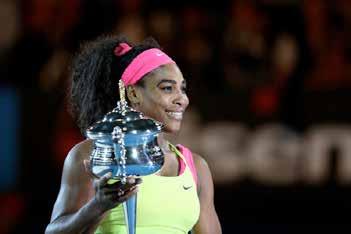
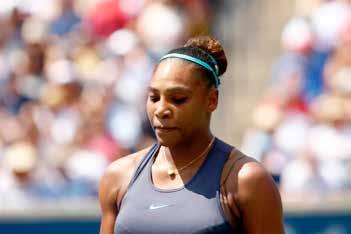


I won’t fight my Nigerian brother says Usman
He avoids clash with Adesanya in UFC Middleweight
What could be a clash of two Nigerian brothers in the Ultimate Fighting Championship (UFC) may have been avoided following a declaration by the Welterweight champion, Kamaru Usman, that he would never stage a fight against his friend, Israel Adesanya. Usman stated that he would be interested in moving up to the middleweight division, but only if Adesanya was no longer champion. Kamaru Usman, who hails from Auchi, Edo State and Israel Adesanya, a native of Odogbolu in Ogun State are two eminent characters in the Mixed Martial Arts (MMA). Usman says he would ‘absolutely’ consider stepping up to 185 pounds after he beat Gilbert Burns 34 seconds into the third round at UFC 258 – taking his record to 18-1, defending his title for the third time, and breaking Georges St Pierre’s consecutive welterweight victories record in the process.
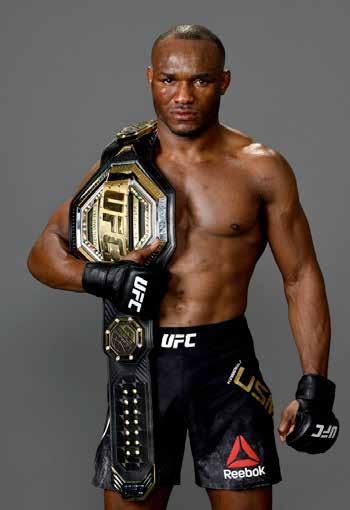

However, the Nigerian-born Texan has admitted the move is dependent on Adesanya as he ‘would never entertain going up to fight Izzy’ and claims he would rather ‘two Africans held belts than one African with two belts’. The Nigerian Nightmare who is set for welterweight rematches against Jorge Masvidal, Colby Covington, and Leon Edwards has said he would consider the step up if Adesanya says he wants nothing to do with’ the middleweight anymore. He told the press: ‘Absolutely, absolutely. If Izzy’s willing to move up – well he is moving up, but if he’s willing to give up that 185 belt and says “I have nothing to do with that anymore”, then absolutely I would entertain that thought.’ Usman and Adesanya are regarded as two of the most dominant champions in the UFC at present, but neither of them will lay a glove on each other due to a long-standing friendship. However, it is likely that Adesanya will step up a weight class to fight Jan Blachowicz for the light heavyweight title. Should he be successful, he may vacate his middleweight title in the future and give Usman the opportunity to challenge for the 185-pound belt.


But if Adesanya chooses to keep hold of both his belts, Usman has made it clear he will not even entertain’ the idea of moving up a weight category to challenge his friend. Usman said: ‘On no account right now would I ever entertain going up to fight Izzy. That’s just not something that I’m interested in. ‘I’ve stated over and over before, I’d rather two Africans with belts as opposed to one African with two belts. ‘After March, it’s gonna be three Africans with four belts. It’s a good time to be an African.’















